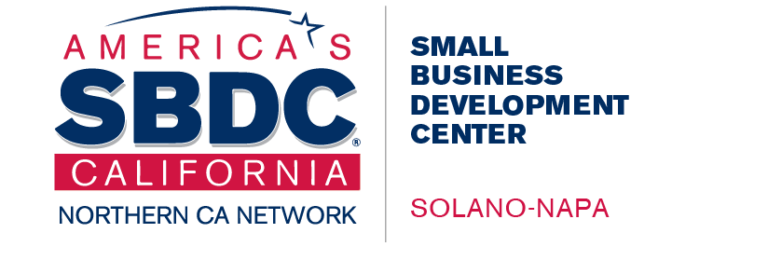starting a Business in solano or napa County
Planning to start a small business? Solano-Napa SBDC can help shape your ideas and dreams into a practical plan.
We’ve taken thousands of new businesses from simple ideas to successful companies, so tap into our key services to join their ranks.
Getting started is often the hardest part. Having a sense that your idea has real potential for success can go a long way, giving you the confidence to take that first hard step.
We will work with you to perform a feasibility analysis of your potential startup business, including market identification, market-entry, breakeven budget, and market pricing data.
We will then guide you through the steps necessary to validate the business idea through potential customer feedback or test sales.
Get Started with Workshops
Completing the Startup workshops (Starting a Business in Solano or Napa Counties or Starting Your Business Part 1 and Part 2) is required before you can meet and work with a Business Advisor.
Our startup workshops cover the essentials to successful business ownership. Learn about target market, budgeting, financing, the documentation you need to make your business official and more.
Solano-Napa SBDC also offers live and recorded workshops on a wide variety of business topics for all industries including retail, restaurants/food production, manufacturing, personal services, technology, the creative arts and more.
All startup workshops are at no cost to you.
Our Startup Expertise
Becoming an Employer
When you start signing the front of checks, your responsibilities to your employees and government and state agencies increase. When you start signing the front of checks, your responsibilities increase to your employees and government and state agencies. We’ll also help you understand the necessary insurance and tax requirements related to hiring employees and can provide you with contacts to remain updated with all employee compliance issues.
Bookkeeping/Accounting
Getting a proper bookkeeping/accounting system in place is essential. We can help you establish business accounting procedures and standards that ensure proper financial management and legal compliance.
Buying or Leasing Equipment
There are many benefits as well as drawbacks to different operations strategies related to equipment. We consult with you to determine the best option for your business.
Creating a Business Plan
Effective business planning can be the key to your success. A business plan can help you secure finance, prioritize your efforts and evaluate opportunities. It is also typically essential if you are requesting a loan, and can be helpful with building partners and allies.
When you create a business plan, you’ll identify:
- Your vision, mission, and goals
- Your business model/operational strategy
- Products and/or services
- Market research to ensure you are making appropriate decisions/direction
- Marketing plan to reach your customers
- Financial projections
- Capital/funding you will need to start up and operate your business
Financial Projections
We may not have a crystal ball, but we can help you forecast future revenue and expenses to help you pitch to potential investors and lenders for inclusion in your business plan or other funding opportunities.
Hiring Employees
Once you are set up to pay your employees responsibly, we’ll help you set up a new hire checklist for all new employees, including all required documentation, as well as advice on job descriptions, employee manuals, and a compensation outline.
Lease Negotiation
When it’s time to find space for your business, we will partner with you to help you prepare and analyze potential lease agreements to determine each option’s advantages and disadvantages.
Location
If you are creating a brick-and-mortar business, your location is essential. We can help you identify target areas, and understand zoning, build-out needs, and more.
Marketing Plan
Our business experts can provide real-world advice on developing an effective marketing plan that you can execute either on your own or with a marketing firm. We will help you communicate your value proposition in various ways and define your ideal customer to help you connect with people most likely who want to spend money on what you offer.
Start-up Capital
Any business needs money to start. We will work with you to determine the feasibility of accessing various private or public financing arrangements for your business by analyzing your financial statements and credit history against lender requirements. We can also work with you to develop an action plan and timeline for obtaining capital.
Start-Up Logistics
This includes permits & licenses, making sure you have an appropriate legal structure, and business name.
It may also include:
- Getting a resale license
- Getting an employer ID (EIN)
- Hiring employees
- Partnership agreements
- Negotiating/signing a lease
- Establishing a bookkeeping system
Resource Guides for Solano & Napa Counties
Business Startup FAQs
Do I have what it takes to be an entrepreneur?
Before you quit your day job or spend money starting up, ask yourself these questions:
- Am I a risk taker?
- Do I understand basic financial and marketing principles?
- Do I have any experience in the business I want to start?
- Can I support myself and my family while I get things started?
If you answer ‘no’ to any of the questions, you may want to consider another career path. If you can answer ‘yes’ to most of the questions, then it may be time to get started.
For a comprehensive look at what it takes, attend a Starting Your Business workshop.
What are the steps to starting a business?
It depends on the type of business you are starting. Tthere will typically be many more steps depending on your type of business, your services/products, and where you are located. Here are the essential steps:
- Feasibility study: Determine the practicality and viability of your business idea or concept.
- Plan and analyze: Write a business plan or create a lean canvas of your business idea, including a financial analysis to see whether or not your business will generate enough for you to do the business.
- Funding: Identify and secure the capital needed to successfully start and operate. This can include the purchase of property, equipment, R&D, operating costs, working capital, and more. Learn more about SBDC support for funding.
- Plan for your location, including zoning and all location-requirements, whether you will have a commercial space, work out of your home, or use a coworking space. You can find your local zoning contacts on our Licenses & Permits page.
- Legal Structure: Select the best legal structure for your business (Note: you may choose a structure to start and change that structure later, such as starting as a sole proprietor and then changing to an LLC later once the company has grown).
- Licenses & Permits: Obtain the required licenses and permits required for your business to operate, which may include a Fictitious Business Name, a Business License, Seller’s Permit and more. See contact info for Solano & Napa Counties on our Licenses & Permits page.
- Will you have employees? Determine employee and/or contract labor needs and required documentation. Worker’s compensation and payroll will also be essential, as well as planning for a number of legal aspects. Solano-Napa SBDC can help you review concerns you will need to address through our no-charge expert advising. Request SBDC services.
- Implement an accounting system: have a method (on your own or via a bookkeeper) for recording your business transactions, consider hiring an accountant for taxes, and understand the type of federal, state, and local taxes your business will pay.
What permits and licenses do I need?
It depends on your location and your type of business. Typical requirements may include:
Business license from the city where your business is located. If you are outside of city limits:
- Solano County requires a business license even if you are in an unincorporated part of the county, except for childcare businesses (which require other licensing).
- Napa County does not require a business license if you are in the unincorporated part of Napa County.
Fictitious Business Name is typically required for the name of your business (except when you are using your own/partner names; see additional details at calgold.ca.gov).
Employer Identification Number (EIN) is required if you will have employees or are a business partnership or corporation.
Sales & Use Permit (Seller’s Permit) if you are selling tangible items.
Location-based businesses may also have to receive:
- Land use permit/zoning clearance
- Building permit
Workers’ Compensation is required by businesses with employees.
Food businesses will need to have a Health Permit. If selling alcohol, an Alcoholic Beverage License will be required.
There are other requirements depending on your type of business, legal organization, and your location.
Learn more on our Licenses & Permits page
Do I need a Federal Employer Identification Number (EIN)?
That depends on the legal structure you choose for your business. If you decide you’ll operate as a sole proprietorship and use your name for the business, you can use your social security number as the business identification number.
Using a different name and/or hiring employees requires obtaining an Employer Identification Number (EIN) from the IRS. Find Form SS-4, the EIN application, and apply online at www.irs.gov.
Do I need business insurance?
It depends on many factors, especially the risk associated with your business, industry, people, and location. For example, if you are planning to set up a manufacturing operation, the risks can be substantial. However, if you are a consultant providing services from your home online and without any employees, your risks are lower.
Business insurance can safeguard your investment and minimize the financial risks associated with events such as a natural disaster, lawsuit, or data breach with a well-planned insurance program. The key is to know your specific risks and the types of insurance that will mitigate those risks.
A current popular option is a package Business Owner’s Policy that covers General Liability, Property and Business Income Insurance. Speak to your insurance agent to learn what other types of coverage would be best for your particular business.
What is a Fictitious Business Name and do I need one?
A Fictitious Business Name (FBN) Statement is a public record that identifies the people doing business under the FBN. Banks often insist on a copy of the FBN Statement before opening a commercial account to satisfy them that John Smith has a right to deposit checks written to “Smith and Company Catering.”
You are required to file a FBN if the business name you have chosen is different from your own legal name. For example, if your legal name is John Jones and you have chosen a name that includes your last name (“John Jones House Repair” or “Jones House Repair”), then you do not need to file.
Filing your FBN is required before opening a business checking account in the title of the business.
You file your FBN with the county government. Be sure to check the availability of your desired business name: California Business Name Availability, www.sos.ca.gov/businessprograms/business-entities, provides information on how to check to make sure a business name does not already exist and may be used.
For information on filing a fictitious business name in Solano County, visit the Solano County Clerk’s Office. solanocounty.com/depts/ttcc/county_clerk/fbn
For information on filing a fictitious business name in Napa County, visit the Napa County Clerk’s Office. countyofnapa.org/1333/Fictitious-Business-Name-FBN
At the time of this writing, the cost for registering a single fictitious business name in either county with one registrant is $50. Each additional business name and/or registrant names is $7 per DBA and/or registrant.
After filing, your fictitious name must be published in local print media – once a week for four consecutive weeks in a local adjudicated newspaper. The clerk’s office will provide a list of adjudicated local newspapers at the time the statement is filed.
For more details about other requirements, see our Licenses & Permits page
NOTE: This page is for informational purposes only and does not constitute advice. For the most up-to-date information, contact the appropriate city, county, state, or federal office.


